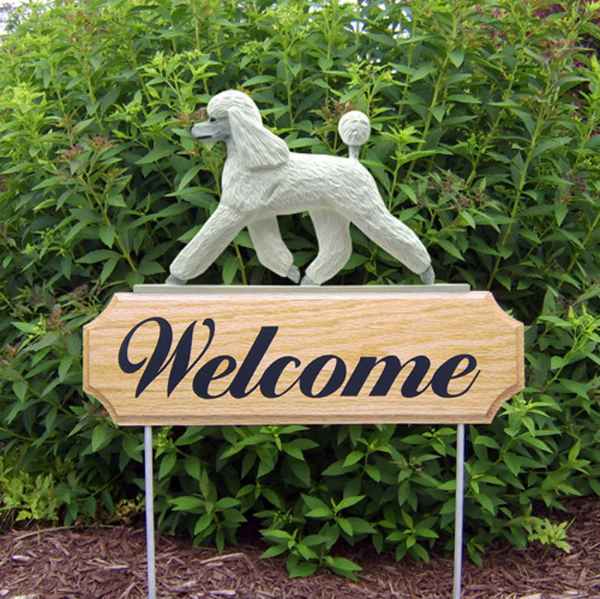- Small Dog Place Home
- A to Z Breed List
- Toy Poodle
Toy Poodle: Is this the Right Breed for You?
By Janice Jones |Last Updated 07-20-2021
Thinking about a toy poodle? Well, If you are looking for a playful, highly intelligent and overall sweet dog then this breed may be the one for you.
The name Poodle comes from the German word Pudel that means “puddle” because these dogs are actually water retrievers. The Poodle is a very beautiful and elegant dog and they also are blessed with a very proportionate body.
 White Toy Poodle
White Toy PoodleThey are the only
breed that comes in three different sizes and are thus registered with the AKC
under separate groups. (Toy Breeds and Non-Sporting Breeds). These include the standard, the miniature, and the
toy, which stands less than ten inches.
The toy poodle can be slightly yappy sometimes, but they all make excellent watchdogs.
Probably the most beneficial reason to have a Poodle, for most people, is that they are hypoallergenic.
This is a key characteristic for a lot of people, especially those who have bad allergies.
Poodles are also crossbred with other breeds to make a wider variety of hypoallergenic dogs.
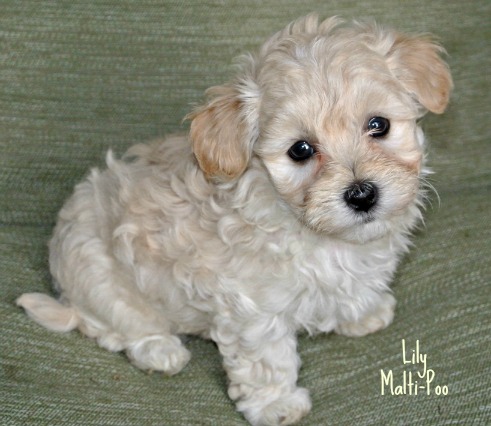 Apricot colored Malti-Poo
Apricot colored Malti-PooPoodles are also crossbred with other breeds to make a wider variety of hypoallergenic dogs.
Some of these include, but are not limited to the “Labradoodle” ( Poodle and Labrador), the “Woodle” (Wheaton terrier and Poodle), and the “Cockapoo” which is a mix between the Cocker Spaniel and the Poodle.
Among small dogs, the Malti-Poo, Shi-Poo, and Yorkie Poo are becoming the number one choice of people wanting playful, loving, yet hypoallergenic dogs. All of these are beautiful dogs with a coat that doesn’t shed.
Because of the Toy Poodle’s intelligence, they are extremely easy to train. They are very smart and pick up on commands very easily.
There are Poodles successful in essentially every activity that dogs have tried, and are unofficially ranked second to Border Collies in intelligence.
The need to please makes them perfect Seeing Eye dogs, service dogs, and therapy dogs.
These dogs are adaptable and make the perfect pet for families or singles. As long as they have plenty of space to run and roam about to please their active personality, they will be the perfect dog for you.
Quick Facts
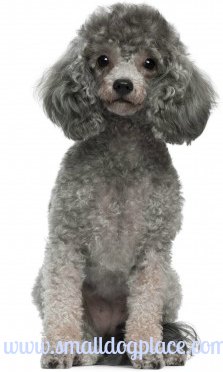
Other Names Used: Barboncino, Nano, Barbone, Caniche, Dwarf Poodle, French Poodle, Parti Poodle, Teddy Poodle
Affiliation: Non-Sporting (Standard and
Miniature) and Toy (Toy) Groups; AKC and CKC. The Kennel Club (KC) places the three sizes of poodle in the Utility Group
Size
Height: Toy: 10 inches or under.
Weight: Toy: 6-9 lbs
Coat: single layer coat of hair, rather
than fur with a curly texture
Colors: Black, Brown, White, Grey, Cream, Silver, Sable, Red, Blue, and Apricot
Country of Origin: France and Germany
Activity Level: Very active (high activity level)
Life Expectancy: 11- 15 years
Good with Children: yes
Good with Other Pets: yes
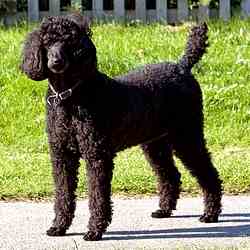 Black Colored Toy Poodle
Black Colored Toy PoodleHistory
 Apricot Colored Toy Poodle
Apricot Colored Toy PoodleStandard Poodles were originally hunting dogs with roots in northern Europe. They were known to be originally from Germany, but standardized in France where they were very commonly known as water retrievers.
Whereas Miniature Poodles may have been used to truffle hunters and Toy Poodles were used in circuses and performances. The Standard Poodle is said to be the oldest type, but other research shows that there might have been a smaller breed of Poodle before the Standard came along.
You may wonder how we got from these strong and menacing hunting dogs to the fluffy, little foo-foo dog that has been bred over time.
The pattern and clip of the Poodle was actually originally designed by hunters and they shaved all the hair and then kept the poofs by the joints and vital organs which was to help them move quicker and more comfortably through the water. With that being said, it is a false accusation to say that Poodles are always feminine and only for females.
Personality
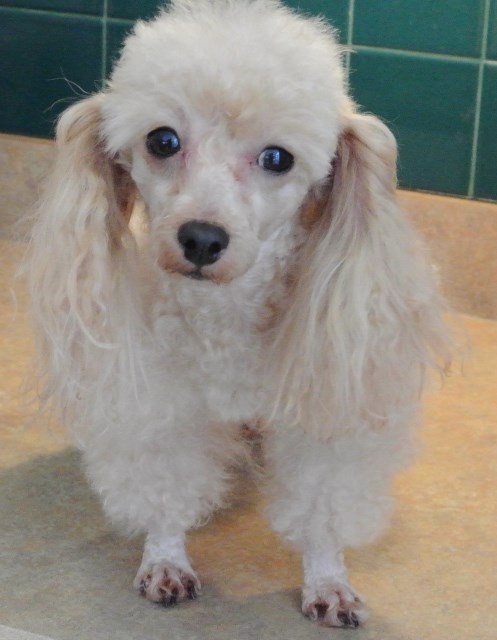 Apricot Colored Toy Poodle
Apricot Colored Toy PoodlePoodles are highly energetic, but have a tendency to get bored rather quick.
If they are not occupied with some sort of toy or treat, they sometimes will become curious and find something to do themselves, which may not be on the same terms as what the owner would like.
They are also very alert, which is why they make such good watchdogs. They are highly trainable and are also very faithful to their owner(s).
With good training, these dogs will never bite the hand that feeds them.
Toy Poodles are also very active and do well with active families.
Any
chance they can get they would love to be playing fetch, or running around the
yard as long as they are being supervised. However, with Toy Poodles, if they
get enough exercise outside, they will be pretty calm indoors and follow you
around, or lie with you.
Perfect Gift for a Poodle Lover
The Toy Poodle, At a Glance
| Traits | Rating |
|---|---|
| Playfulness | |
| Affection Level | |
| Friendliness Towards Strangers | |
| Good with Children | |
| Good with Other Dogs | |
| Good for First Time Owners | |
| Exercise Needed | |
| Ease of Training | |
| Watch Dog Ability | |
| Grooming Requirements | |
| Shedding | |
| Cold Tolerant | |
| Heat Tolerant |
Dog Breed Ratings Got You a Little Confused?
Here's a little help in understanding them
- Playfulness: Most Playful = 5 Least Playful = 1
- Affection: Most Affectionate = 5 Least Affectionate = 1
- Friendliness Towards Strangers: Most Friendly = 5 Least = 1
- Good With Children: Great= 5 Not Good with Children = 1
- Good With Dogs: Great = 5 Not Good Around Dogs = 1
- Good With First Time Owners: Fine=5 Not Appropriate = 1
- Exercise Required: Extensive Daily Exercise = 1 Minimal = 1
- Ease of Training: Very Easy = 5 Difficult = 1
- Watch Dog: Excellent Watch Dog = 5 Minimal = 1
- Grooming: Time Consuming = 5 Minimal = 1
- Shedding: Heavy Shedder = 5 Minimal = 1
- Cold Tolerance: Well Tolerated = 5 Poor Tolerance = 1
- Heat Tolerance: Well Tolerated = 5 Poor Tolerance = 1
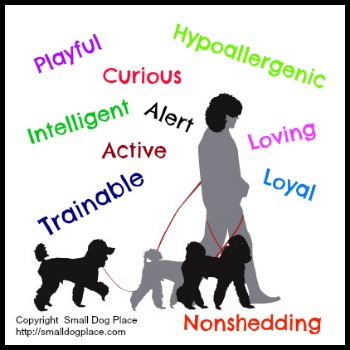 Toy Poodles
Toy PoodlesToy Poodles make the perfect pet for anyone who is dedicated to them and can give them the proper care they deserve. Perky, sweet, and lively, this dog loves to be around people and is quite sociable.
However, do not let their kindness and playfulness trick you, because they definitely need a pack leader. Without a confirmed leader in charge, your Poodle could snap, and that is not what anyone wants.
Also without proper training, your pup could be high-strung and timid. With training being such an ease that should never be a problem, as long as you’re willing to commit to your Poodle, as you would do with any breed of dog.
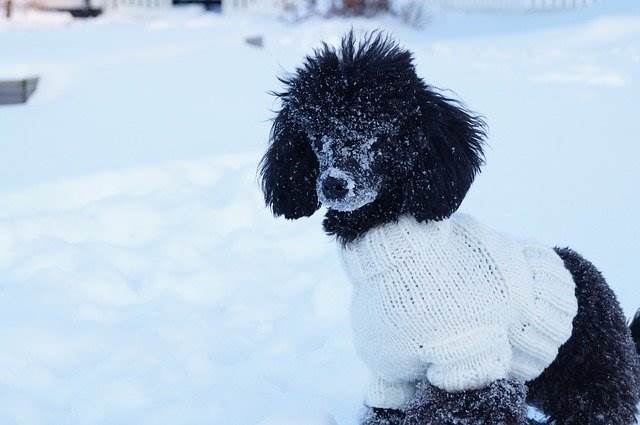 Black Toy Poodle Enjoying the Snow
Black Toy Poodle Enjoying the SnowGrooming
Toy Poodles can be quite tricky to groom because instead of the double layer of fur that most breeds have, they have a single layer of hair.
The difference is that fur will grow to a certain point and then shed out, but hair on the other hand keeps growing longer and longer and when it does fall out, it becomes intertwined with the surrounding hair, which is why Poodles do not seem to shed.
They do shed a little bit, but it usually is not enough to bother someone, and this is why they are one of the only small hypoallergenic dogs.
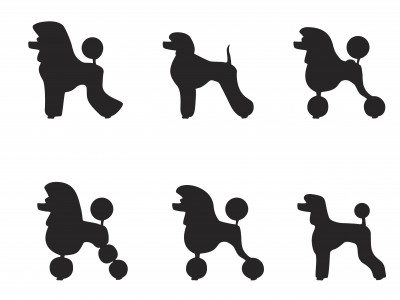 Outline of a variety of Poodle Clips
Outline of a variety of Poodle ClipsIt is said that there is no breed of dog that you will spend more money on potentially than a Poodle. With their curly hair, it can get very knotted and needs to be groomed very often.
They need to be bathed regularly, every 1-2 weeks to keep everything in check and should be taken to the groomers to get the proper cut every 6-8 weeks or so.
There are many different cuts for Toy Poodles; some include the puppy clip, the bikini clip, and the most popular, the continental clip.
Puppies have a different clip altogether. The continental clip where the rear half of the body is shaved, bracelets are left around the ankles, and pom-poms are left on the tails and hips.
Another popular, and overall easy clip is the puppy clip where the hair is just kept short over the whole body. This is most popular for owners that have no intent to show their Poodle. Of course for every dog, their teeth, ears, anal glands, toenails, etc. needs to also be checked regularly.
Health Concerns for the Toy Poodle
Even though Toy Poodles have been bred over such a long period of time, they are still prone to diseases that include, but are not limited to...
Addison's Disease
Addison’s Disease is the illness most commonly reported congenital problem in the poodle. Addison's disease is characterized by insufficient production of glucocorticoid and/or mineralocortoid in the adrenal cortex. Addison's is often not diagnosed because early symptoms are vague and easily mistaken for other conditions. The most common findings include frequent episodes of gastroenteritis, loss of body condition and a poor response to stress.
Read more about Addison's Disease
IMHA (Immune Mediated Hemolytic Anemia)
Normally, red blood cells live around 4 months in dogs. As the age, they are destroyed and removed by other cells in the system. IMHA is when the red blood cells are destroyed prematurely; at a rate faster then new ones can be produced. It can occur at any age, but is more common in middle-aged female dogs.
Cataracts
As with humans, a cataract in dogs leading to impaired vision and blindness and is due to clouding of the lens inside the eye.
Heart Murmurs
Heart murmurs are caused by a disturbance in the blood flow through the chambers of the heart. They're an indicator that there may be a disease or condition of the heart that will need to be monitored and treated.
Epilepsy
A brain disorder that causes the dog to have physical attacks (seizures) that are sudden and uncontrollable. If you think your dog may have this, contact the vet immediately.
Collapsed Trachea
A condition in which the rings in the trachea flatten or collapse making breathing more difficult.
Pros
- Great for people with allergies (hypoallergenic)
- Extremely intelligent and highly trainable
- Makes for great service, therapy, and seeing eye dogs
- Fantastic temperament, very social
- Does well with families, kids, and other pets
- Adapts very quickly to new environments
- Extremely affectionate
Cons
- Need regular grooming
- Tendency to become bored very easily
- Can be yappy at times
- Needs lots of physical and mental exercise
Books Worth Reading
Thinking about getting a Toy Poodle? Already have one but want to learn more? It is always a good idea to read as much as you can about the breed. Here are a few of the best books I've found on this breed and it is well worth looking into getting at least one breed book.
Interesting Facts
Did you know that there are actually contests and competitions where people color and shave their poodle’s hair into sculptures?
Some Toy Poodles can live up to 20 years, if they are healthy. The oldest recorded poodle that ever lived was Lady who lived to be 28 years and 218 days old. (1908—1937)
Breed Club:
From Toy Poodles to A to Z Small Dog Breeds
About Janice (author and voice behind this site)
Having lived with dogs and cats most of her life, Janice served as a veterinary technician for ten years in Maryland and twelve years as a Shih Tzu dog breeder in Ohio.
Her education includes undergraduate degrees in Psychology with a minor in biology, Early Childhood Education, and Nursing, and a master's in Mental Health Counseling.
She is a lifelong learner, a dog lover, and passionate about the welfare of animals. Her favorite breed for over 50 years has been the Shih Tzu, but she has also lived with Poodles, Maltese, Yorkshire Terriers, Beagles, English Bulldogs, Carin Terriers, and a Cocker Spaniel.
When not writing, reading, and researching dog-related topics, she likes to spend time with her eight Shih Tzu dogs, husband, and family, as well as knitting and crocheting. She is also the voice behind Miracle Shih Tzu and Smart-Knit-Crocheting
Does This Article Deserve Your Thumbs Up?
We always appreciate your support and encouragement. Your thumbs up means so much to us. Please like this article.
If you find this page or any page on Small Dog Place Helpful, or useful in anyway, I'd love it if you would click the small heart found on the bottom right of each page.
You can also share or bookmark this page -- just click on the:

Free Monthly Newsletter
Sign Up for Our Free Newsletter and get our Free Gift to You.
my E-book, The Top 10 Mistakes People Make When Choosing a Dog (and how to avoid them)
